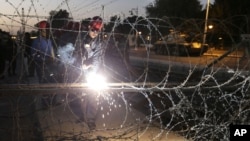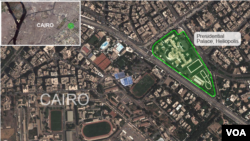CAIRO —
Under a heavy military presence, the bulk of demonstrators cleared out from an area near Egypt's presidential palace Thursday afternoon, reducing, for the time being, protests against President Mohamed Morsi and a proposed constitution.
Members of the elite Republican and Presidential Guard units placed barbed wire across the main road near the palace to separate the few hundred supporters and opponents of the president still camped out in the area. A handful of tanks and armored personnel carriers took up positions outside the palace.
From the scene, VOA Cairo Bureau Chief Elizabeth Arrott says the palace neighborhood has been under a siege of protests for more than 24 hours.
"It's an upscale neighborhood, so a lot of people live there and they can't avoid it," she said. "It was very, very tense in the areas. They were throwing Molotov cocktails, petrol bombs and rocks and it was running street battles. They were going back and forth and of course these are where people live."
Elizabeth Arrott describes the protests:
Morsi to address the nation
A member of the president's entourage told The Associated Press that Morsi was "going about business as usual" inside the palace.
Arab media report that the president will address the nation later in the day.
Opposition leaders called for another demonstration against the country's new draft constitution later Thursday, and a larger demonstration following Friday prayers.
The leader of the umbrella opposition coalition, Mohammed ElBaradei, told supporters Wednesday that he and his colleagues would not negotiate with the president until he withdraws the draft constitution and cancels a planned December 15 referendum.
He said that the opposition is open to dialogue but can not accept the constitutional document under any circumstances and that protests will continue, including a possible general strike. ElBaradei said the regime has lost its legitimacy because it is a tyranny.
Omar Ashour, who teaches political science at the University of Exeter in Britain, said that it will be difficult to bring an end to the popular protests, because the opposition is a diverse set of groups and that each has a different goal:
"The opposition is not a united entity in any way," he said. "They have very different targets. Some have toppling the regime; some are bringing back the former regime figures in power, some are about the constitution, some are about the constitutional declaration.
"So it's not really a united command," he said. "No matter what [Morsi] will give, there will be some opposition on the streets."
Long-term, Ashour believes that the only way out of this crisis is for Egypt to "build institutions that represent the Egyptian people," rather than just "two opposing political camps, each of which insists that it speaks on behalf of the Egyptian people."
Death toll
Five people were killed and more than 350 were injured during the violence in Cairo.
The violence started Wednesday when Morsi's Islamist supporters attacked opposition demonstrators angered by the president's decree issued last month. The mandate granted Morsi sweeping powers that place him above review from the judiciary.
The clashes outside the presidential palace marked the first time that political rivals in deeply divided Egypt have battled each other since last year's protests that ousted longtime authoritarian president Hosni Mubarak.
A referendum on the constitution is set for December 15, though reports surfaced on Thursday indicating a possible postponement.
Members of the elite Republican and Presidential Guard units placed barbed wire across the main road near the palace to separate the few hundred supporters and opponents of the president still camped out in the area. A handful of tanks and armored personnel carriers took up positions outside the palace.
From the scene, VOA Cairo Bureau Chief Elizabeth Arrott says the palace neighborhood has been under a siege of protests for more than 24 hours.
"It's an upscale neighborhood, so a lot of people live there and they can't avoid it," she said. "It was very, very tense in the areas. They were throwing Molotov cocktails, petrol bombs and rocks and it was running street battles. They were going back and forth and of course these are where people live."
Elizabeth Arrott describes the protests:
Morsi to address the nation
A member of the president's entourage told The Associated Press that Morsi was "going about business as usual" inside the palace.
Arab media report that the president will address the nation later in the day.
Opposition leaders called for another demonstration against the country's new draft constitution later Thursday, and a larger demonstration following Friday prayers.
The leader of the umbrella opposition coalition, Mohammed ElBaradei, told supporters Wednesday that he and his colleagues would not negotiate with the president until he withdraws the draft constitution and cancels a planned December 15 referendum.
He said that the opposition is open to dialogue but can not accept the constitutional document under any circumstances and that protests will continue, including a possible general strike. ElBaradei said the regime has lost its legitimacy because it is a tyranny.
Omar Ashour, who teaches political science at the University of Exeter in Britain, said that it will be difficult to bring an end to the popular protests, because the opposition is a diverse set of groups and that each has a different goal:
"The opposition is not a united entity in any way," he said. "They have very different targets. Some have toppling the regime; some are bringing back the former regime figures in power, some are about the constitution, some are about the constitutional declaration.
"So it's not really a united command," he said. "No matter what [Morsi] will give, there will be some opposition on the streets."
Long-term, Ashour believes that the only way out of this crisis is for Egypt to "build institutions that represent the Egyptian people," rather than just "two opposing political camps, each of which insists that it speaks on behalf of the Egyptian people."
Death toll
Five people were killed and more than 350 were injured during the violence in Cairo.
The violence started Wednesday when Morsi's Islamist supporters attacked opposition demonstrators angered by the president's decree issued last month. The mandate granted Morsi sweeping powers that place him above review from the judiciary.
The clashes outside the presidential palace marked the first time that political rivals in deeply divided Egypt have battled each other since last year's protests that ousted longtime authoritarian president Hosni Mubarak.
A referendum on the constitution is set for December 15, though reports surfaced on Thursday indicating a possible postponement.






